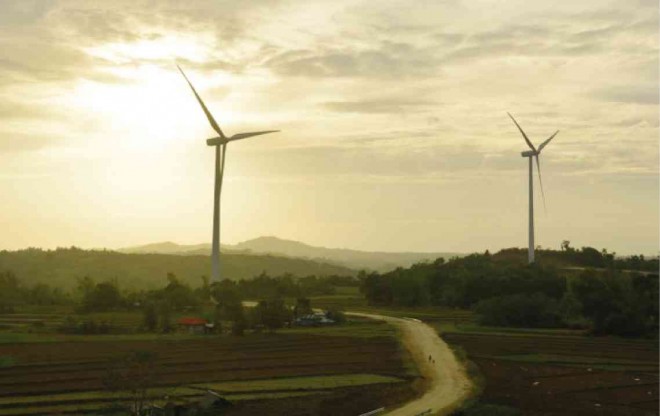With unique charm, Panay wind farms lure tourists

The wind turbines in San Lorenzo town, Guimaras province, have provided an added attraction to the scenic coast of the island. Photo courtesy of Trans-Asia Oil and Energy Development Corp.
Like those in northern Luzon, the wind farms in Guimaras and Aklan provinces have been attracting tourists while offering their own unique charm.
The wind turbines in Bangui town, Ilocos Norte province, are lined in a single row along the coast and are facing the sea, while those in Guimaras and Aklan are spread out in distances varying from a few hundred meters to kilometers.
In Guimaras, the turbines were installed in the villages of Suclaran, Cabano, M. Chavez and Cabungahan in San Lorenzo town. Some are near roads while others are on the hills. The wind farm produces 54 megawatts of power.
Those in Nabas town, Aklan, are 76 meters tall and stand on a 24-million-square-meter (2,400-hectare) property, facing different directions in Barangay Pawa, a few kilometers from the national highway. Pawa is about 20 minutes from Caticlan port in Malay town, the jump-off point to Boracay Island, and about an hour’s ride from the capital town of Kalibo.
Like giant guards
Article continues after this advertisementTourists in Boracay can see the white towering turbines on hilly areas from across the sea, appearing like giant sentinels on top of the Aklan mainland.
Article continues after this advertisementPetroGreen Energy Corp., a subsidiary of PetroEnergy Resources Corp. (PERC), operates the Nabas wind farm.
The first phase of the project covers 18 turbines, each with a capacity to generate 2 MW, said Francisco Delfin Jr., PERC vice president and chief operating officer. It cost $103 million (about P4.58 billion at an exchange rate of 1$:P44.48) and is considered one of biggest single investments in Aklan.
Eight turbines are already operating while the remaining 10 are expected to be in full operation by the end of June or early July. Seven more, which can produce a total of 14 MW, will be put up during the second phase.
The project is expected to boost the economy of the province, especially Nabas, a fourth-class municipality (annual income: P25 million-P35 million), with revenue from taxes, royalty, businesses and other fees, and its share of 1 centavo per kilowatt-hour of power produced.
Communities near the site are expected to earn from tourism-related activities. PERC had already conducted livelihood training and orientation meetings, and provided educational and health assistance to residents, Delfin said.
Power supply boost
The wind farm will also boost efforts to stabilize energy supply and voltage on Panay Island, especially Aklan and Boracay, according to provincial administrator Selwyn Ibarreta. The two places are at the tail end of the Visayas grid, which mostly gets its supply from geothermal plants in Leyte province.
Panay residents usually experience voltage fluctuations and power interruptions.
The Guimaras wind farm has also augmented the power supply of the grid.
Its 27 turbines have caught the attention of tourists. They go near to the wind turbines to take their selfies. Each turbine measures 40 meters wide and 78 meters tall and, like in Nabas, can produce 2 MW.
Guimaras provincial tourism officer Angie Gabinete said the wind farm had helped boost tourist arrivals from 388,000 in 2013 to more than 446,000 last year, an increase of 15 percent.
“It’s not just the mangoes anymore. Tourists are visiting the wind farm and we are having difficulty keeping up with the demand for souvenir items,” Gabinete said.
‘Game-changer’
Revenues from tourism rose by 50 percent from P1 billion in 2013 to P1.5 billion last year.
Gov. Samuel Gumarin described the project as a “game-changer” for the local economy. The P6.4-billion project of Trans-Asia Renewable Energy Corp. (Tarec), a subsidiary of the Phinma Corp., is considered the biggest investment in the province.
Full commercial operations started on Dec. 27, 2014, said Ramon del Rosario Jr., Phinma president and chief executive officer.
A 138-kilovolt submarine cable connecting Guimaras and Iloilo province replaced the 13.2-kv system to ensure that maximum output of the wind farm can be transmitted to the grid.
Tarec built 11 kilometers of roads and widened existing ones as part of the project. It is exploring the possibility of putting up more turbines in Sibunag and Nueva Valencia, including a 40-MW wind farm in Sibunag, according to Del Rosario.
Companies engaged in tapping renewable energy sources are hoping that the government will ensure and increase the feed-in tariff (FIT) allocation so that investors can be assured of the viability of their projects. The FITs are fixed rates granted by the government as incentives to developers of renewable sources of energy, including wind, hydro, solar and biomass.
The current rate for wind energy is P8.53 per kWh and the FIT allocation is 200 MW.